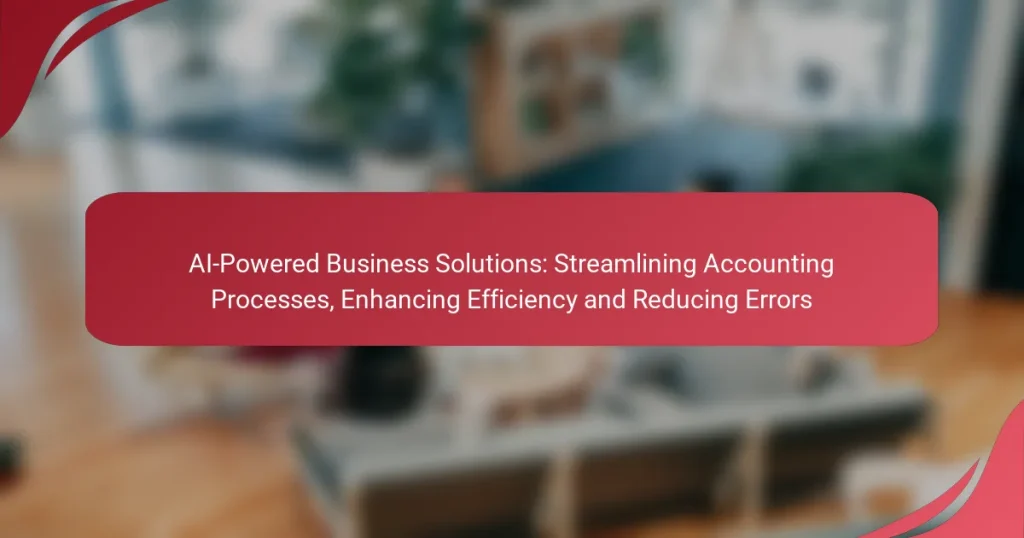AI-powered financial management solutions leverage artificial intelligence to optimize accounting processes and enhance decision-making capabilities. By automating routine tasks and analyzing extensive datasets, these tools provide valuable insights that enable businesses to manage their finances more effectively and adapt to market changes with greater agility.
AI-Powered Business Solutions: Risk Management Techniques, Financial Institution Strategies and Compliance
AI-Powered Business Solutions: Personal Finance Management Apps, Consumer Benefits and Budgeting Assistance
AI-Powered Business Solutions: Investment Analysis Tools, Retail Investor Insights and Market Trends
AI-Powered Business Solutions: Fraud Detection Impact, Financial Transaction Security and Risk Mitigation
AI-Powered Business Solutions: Financial Forecasting Tools, Selection Criteria and Benefits
AI-Powered Business Solutions: Streamlining Accounting Processes, Enhancing Efficiency and Reducing Errors
What are AI-powered financial management solutions?
AI-powered financial management solutions utilize artificial intelligence to streamline accounting processes, enhance decision-making, and improve financial forecasting. These tools automate routine tasks, analyze large datasets, and provide insights that help businesses manage their finances more effectively.
QuickBooks Online
QuickBooks Online is a widely used AI-driven financial management tool that offers features like automated invoicing, expense tracking, and real-time financial reporting. It integrates seamlessly with various banking systems, allowing users to sync transactions and manage cash flow effortlessly.
Businesses can benefit from QuickBooks Online’s AI capabilities, which include predictive analytics for cash flow forecasting and intelligent categorization of expenses. This software is suitable for small to medium-sized enterprises looking for a comprehensive solution.
Xero
Xero is another popular AI-powered financial management platform that focuses on user-friendly design and robust functionality. It provides features such as bank reconciliation, invoicing, and payroll management, all enhanced by AI for improved accuracy and efficiency.
With Xero, users can take advantage of its machine learning algorithms that learn from past transactions to suggest categorizations and automate repetitive tasks. This makes it an excellent choice for businesses that prioritize ease of use and integration with other applications.
FreshBooks
FreshBooks is designed primarily for service-based businesses and freelancers, offering AI-enhanced features like time tracking, invoicing, and expense management. Its intuitive interface allows users to manage their finances without extensive accounting knowledge.
The platform’s AI capabilities help automate billing processes and provide insights into profitability by analyzing project costs and client payments. FreshBooks is ideal for small businesses looking for a straightforward, effective financial management solution.
Zoho Books
Zoho Books is a comprehensive financial management software that leverages AI to automate various accounting tasks, including invoicing, expense tracking, and tax compliance. It integrates well with other Zoho applications, providing a cohesive ecosystem for business management.
With features like smart automation and predictive analytics, Zoho Books assists businesses in making informed financial decisions. It is particularly beneficial for small to medium-sized enterprises that require a cost-effective solution with extensive functionality.
How can AI enhance budgeting and forecasting?
AI can significantly improve budgeting and forecasting by automating data processing and providing insights that enhance decision-making. By leveraging advanced algorithms, businesses can create more accurate financial models and adapt to changing market conditions swiftly.
Automated data analysis
Automated data analysis allows businesses to process large volumes of financial data quickly and accurately. AI tools can identify trends and anomalies in spending patterns, which helps finance teams to make informed decisions without manual intervention.
For example, AI can analyze historical spending data to highlight areas where costs can be reduced, potentially saving businesses a significant percentage of their budget. This automation reduces the risk of human error and frees up valuable time for financial analysts to focus on strategic tasks.
Predictive analytics
Predictive analytics uses historical data and machine learning to forecast future financial outcomes. By analyzing past performance and external factors, AI can generate predictions that help businesses plan their budgets more effectively.
Companies can use predictive analytics to estimate future revenues or expenses, allowing them to allocate resources more efficiently. For instance, a retail business might predict seasonal sales fluctuations, enabling it to adjust inventory and staffing levels accordingly.
Scenario modeling
Scenario modeling involves creating different financial scenarios to assess potential outcomes based on varying assumptions. AI can simulate various economic conditions, helping businesses prepare for uncertainties in the market.
For example, a company might model the impact of a price increase or a sudden drop in demand. By evaluating these scenarios, businesses can develop contingency plans and make more resilient financial strategies. This proactive approach can be crucial in maintaining financial stability during volatile periods.
What are the benefits of AI in financial reporting?
AI enhances financial reporting by providing increased accuracy, speed, and actionable insights. These benefits help businesses make informed decisions and improve overall financial management.
Real-time insights
AI systems can analyze vast amounts of financial data in real-time, allowing businesses to access up-to-date information on their financial performance. This immediacy helps organizations respond quickly to market changes and internal financial shifts.
For example, AI can track cash flow and expenses continuously, alerting managers to potential issues before they escalate. This proactive approach can lead to better liquidity management and informed strategic planning.
Error reduction
AI significantly reduces human errors in financial reporting by automating data entry and analysis. With machine learning algorithms, AI can identify patterns and anomalies that may indicate mistakes, ensuring more reliable financial statements.
Implementing AI tools can decrease the time spent on audits and reconciliations, as these systems can quickly verify data accuracy. Businesses can expect a reduction in discrepancies, which can save both time and resources.
Customizable dashboards
AI-powered financial reporting tools often come with customizable dashboards that allow users to tailor their views according to specific metrics and KPIs. This flexibility enables finance teams to focus on what matters most to their organization.
Users can choose which data visualizations to display, such as profit margins, expense ratios, or revenue growth, making it easier to track performance at a glance. Custom dashboards can also facilitate better communication among stakeholders by presenting clear and relevant financial insights.
How to choose the right AI financial management tool?
Choosing the right AI financial management tool involves understanding your business needs and the specific features that can enhance your financial processes. Focus on tools that align with your size, integration needs, and user experience to maximize efficiency and effectiveness.
Assess business size
Your business size significantly influences the type of AI financial management tool you should select. Small businesses may benefit from simpler, cost-effective solutions that offer essential features, while larger enterprises often require more comprehensive tools with advanced functionalities.
Consider the scale of your operations and the complexity of your financial needs. For instance, a startup might opt for a tool with basic invoicing and expense tracking, while a mid-sized company may need features like forecasting and budgeting capabilities.
Evaluate integration capabilities
Integration capabilities are crucial when selecting an AI financial management tool, as they determine how well the software will work with your existing systems. Look for tools that can seamlessly connect with your accounting software, CRM, and other business applications.
Check for compatibility with popular platforms such as QuickBooks, Xero, or Salesforce. A tool that integrates well can streamline data flow, reduce manual entry, and enhance overall productivity.
Consider user-friendliness
User-friendliness is essential for ensuring that your team can effectively utilize the AI financial management tool. A complex interface can lead to frustration and decreased productivity, so prioritize tools that offer intuitive designs and easy navigation.
Look for features like customizable dashboards, straightforward reporting, and accessible customer support. Conducting a trial or demo can also help gauge how user-friendly a tool is before making a commitment.
What are the challenges of implementing AI in finance?
Implementing AI in finance presents several challenges, including data privacy concerns, integration with existing systems, and the need for skilled personnel. Organizations must navigate these hurdles to effectively leverage AI for improved financial management.
Data privacy concerns
Data privacy is a significant challenge when implementing AI in finance, as financial institutions handle sensitive personal and corporate information. Ensuring compliance with regulations such as GDPR in Europe or CCPA in California is crucial to avoid legal repercussions.
Organizations must adopt robust data protection measures, including encryption and anonymization, to safeguard customer data. Regular audits and assessments can help identify vulnerabilities and ensure that AI systems adhere to privacy standards.
Additionally, transparency in how AI algorithms use data can build trust with customers. Providing clear information about data usage and obtaining informed consent are essential steps in addressing privacy concerns effectively.






